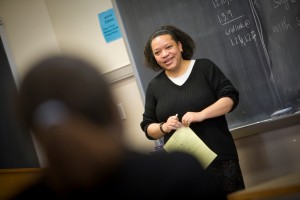
Professor Chawne Kimber
Chawne Kimber has always liked math, but she hasn’t always admitted it.
“I was one of the girls who had to hide it because it wasn’t cool at the time for a girl to like math,” says Kimber, associate professor of mathematics, who grew up in Tallahassee, Fla., where women were discouraged from certain intellectual pursuits.
But then she hit her senior year in high school and her affinity for solving mathematical problems outweighed her need to conform.
“I no longer needed to fulfill cultural norms,” she says.
Watch a video profile of Kimber.
Initially, Kimber majored in chemical engineering at the University of Florida, but discovered she was more of a theoretical thinker after taking a challenging upper-division math class. The professor was Hispanic, which was also a welcome change for Kimber, who had never been taught college-level math by a minority professor before.
“Any role model other than an old, white male was huge for me,” she says, noting there was also an influential female professor in the math department. “It changed my image of how I could fit into the mathematics community.”
Today, Kimber, an algebraist and topologist, is one of the very few female African-American math professors in the U.S. Additionally, national studies show minorities and women continue to be underrepresented in the fields of science, technology, engineering, and math at alarming rates.
But Kimber is trying to change that. Last year, with Professor and Director of Engineering Sharon Jones, she started the Summer Program to Advance Leadership (SPAL), an intense six-week program that gives a diverse group of incoming students a chance to acclimate to college life and the rigors of science and math classes before school starts.
“It helps transition them to the pace, depth, and workload of courses at a school like Lafayette College and provides opportunities to interact with upperclassman,” she says. This year, 10 students went through the program.
Even though Kimber loves mathematics, she understands that it can be intimidating to some people, especially those who’ve never recovered from a bad experience in high school algebra or geometry class. She tries to ease any fears by making the process of learning math as user-friendly as possible.
“I’m very relaxed and laid-back,” she says. “My classes are conversational and there are always opportunities for students to ask questions. There are also oral and written reports. Students have many opportunities to show they understand something.”
Empowering students to succeed is only part of the job. Kimber studies the spatial properties of objects, research which has applications in computer science and cryptology.
It’s a way, she says, of connecting the ethereal world of mathematics to the real one.
